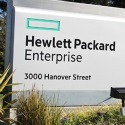
Hewlett Packard Enterprise (HPE) said it will purchase SD-WAN vendor Silver Peak for $925 million in cash. The company said it would put the Silver Peak operation into its Aruba business unit, which it said would accelerate its edge-to-cloud strategy.
The move is noteworthy considering it raises the price tag to almost $1 billion for a leading vendor of software-defined wide-area network (SD-WAN) technology. According to recent numbers from research and consulting firm Omdia (which is owned by Light Reading's parent company Informa), Silver Peak was the fifth-largest SD-WAN vendor by market share last year, behind leaders VMware and Cisco. VMware entered the SD-WAN sector in 2017 with the $449 million purchase of VeloCloud, while Cisco purchased SD-WAN vendor Viptela that same year for $610 million.
HPE said the acquisition would dovetail with its widening edge-cloud strategy. The company wants to support business apps and data wherever they are, whether in a massive, centralized data center or an edge computing facility at a gas station, for example. The company said the combination of Silver Peak's offerings with Aruba's Edge Service Platform (ESP) would allow its business customers to more easily build branch offices and support remote workforces with flexible wide-area networking technologies.
"The need for edge-to-cloud architectures has never been more relevant as enterprises look to extend connectivity to branch locations and enable secure work-from-home experiences. Silver Peak's technology transforms legacy WAN architectures to self-driving WANs, which is a perfect fit with Aruba's cloud-native, AI-driven Edge Services Platform. Together, we will be able to meet these needs with critical connectivity, security, and AI capabilities to drive the next generation of edge-to-cloud transformation," explained Keerti Melkote, president of Intelligent Edge for HPE and founder of Aruba, in a release.
The move comes as HPE looks to enmesh itself more fully into the networking space. For example, the company earlier this year announced it had developed a 5G standalone core system as an alternative to offerings from the likes of Ericsson, Huawei and Nokia.
However, HPE is moving under pressure. The company recently announced an $800 million cost-reduction plan as it struggles to more quickly transition to a services model and away from one-time product sales.
— Mike Dano, Editorial Director, 5G & Mobile Strategies, Light Reading | @mikeddano
About the Author(s)
You May Also Like












